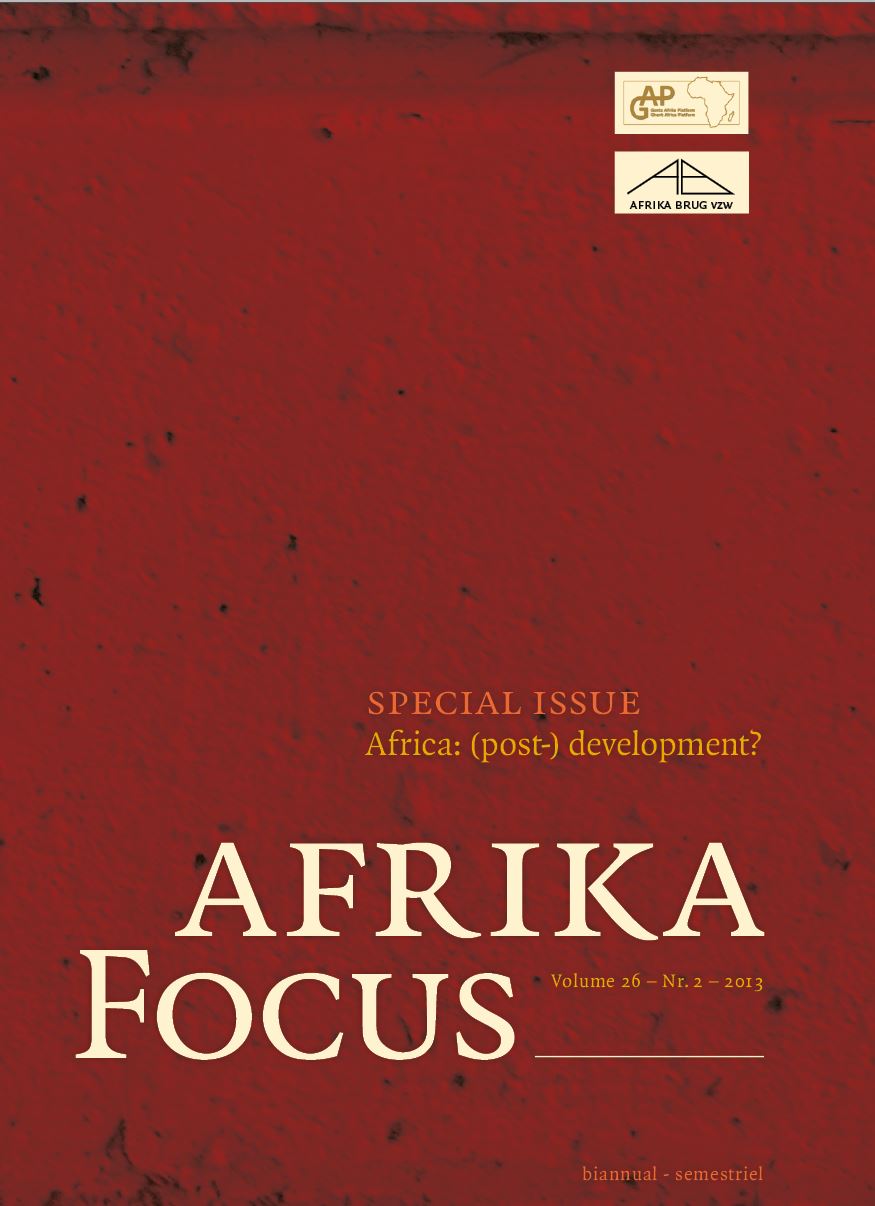Editorial
DOI:
https://doi.org/10.21825/af.v26i2.4964Abstract
The Africa Platform of the Ghent University Association and its journal Afrika Focus have always tried to focus on academic expertise in Africa and on academic north-south collaboration. Through its annual conference and its journal the Africa Platform offers a forum in which African academics and northern scholars working on Africa can forge new and often interdisciplinary collaboration. Most of this research on Africa is highly relevant to the development of African societies, as became clear at the last symposium of 1 This editorial was written just a few days before Nelson Mandela passed away on 5 December 2013. We have lost a great man. Hamba Kahle Madiba. [5 ] the Africa Platform, entitled ‘Africa: (post-development)?’ This special issue of Afrika Focus contains a number of articles that were presented at that symposium, which took place on 7 December 2012. In his article ‘Performance, poverty and urban development: Kigali’s motari and the special city’ Rollason describes the con ict between motorcycle taxis in Kigali and the city authorities. Urban development of Kigali is at stake here as these motari do not seem to match the image of the city the government wants to present. The article by Debusscher ‘Gender equality in European Union development policy: incorporating women’s voices or con rming hierarchies?’ is highly critical of the gender mainstreaming approach of the EU in its development aid towards sub-Saharan Africa. The EU seems to be more con- cerned with reaching its policy goals rather than challenging existing power structures in Africa. Both of these articles raise awareness on the level of a particular development-re- lated issue, and they have the potential to lead to concrete recommendations for national or EU development policies. The three remaining articles in this issue do not t in with the development-topic. Mulamba’s article ‘Luba folklore and women’s ethno-gendered discourse of wifehood in “Cintu Wa Bujitu”’, throws light on the socialization function of the Lubà folk song, a folkloric tradition that seems to perpetuate gender inequalities. Naphulo’s linguistic article (‘Teacher and learner beliefs and expectations about English language teaching at a Mozambican university’) critically analyses English language teaching in tertiary in- stitutions. The conclusion is that cultural backgrounds and beliefs need to be considered in order to enable effective teaching. The nal article of this issue (‘Arbuscular mycorrhizal fungi associated with shade trees and Coffea arabica L. in a coffee-based agroforestry system in Bonga, Southwestern Ethiopia’) examines coffee production and describes how a certain type of fungi could be used as a (natural) alternative to chemical fertilizers, so as to enhance coffee production in the forest areas of Ethiopia. All three of these articles indicate that traditional knowledge – be it linguistic, cultural or botanic – always plays an important role when trying to gain insight into African societies or when trying to improve practices and policies related to education, health care or agriculture. This is an idea that should as a mat- ter of course be a consideration when designing research in an African context. We like to remind the reader that in addition to fully- edged articles, Afrika Focus also publishes reports of doctoral research or eld work. In this issue we offer you four reports of PhDs defended at Ghent University. All four of these PhD degress were ob- tained by African scholars, thus testifying to the vibrant research collaboration that exists between African institutions and this Western European university. These current reports belong to the domains of Biology and Marine Biology, Linguistics and Health Care.Downloads
Published
How to Cite
Issue
Section
License
Authors who publish with this journal agree to the following terms
Authors retain copyright and grant the journal right of first publication with the work simultaneously licensed under a Creative Commons Attribution License that allows others to share the work with an acknowledgement of the work's authorship and initial publication in this journal.
Authors are able to enter into separate, additional contractual arrangements for the non-exclusive distribution of the journal's published version of the work (e.g., post it to an institutional repository or publish it in a book), with an acknowledgement of its initial publication in this journal.
Authors are permitted and encouraged to post their work online (e.g., in institutional repositories or on their website) prior to and during the submission process, as it can lead to productive exchanges, as well as earlier and greater citation of published work (See The Effect of Open Access).


